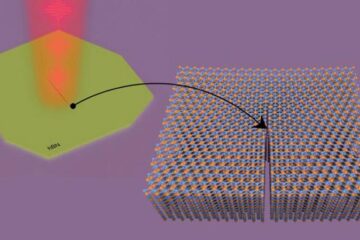Expert develops nanoparticle drug delivery method to replace eye drops

This new method, developed by a team of researchers led by biomaterials and drug delivery expert Dr John Tsibouklis at the University of Portsmouth, uses biodegradable polymer nanoparticles to administer drugs to the eye.
Nanoparticles are microscopic particles measured in nanometres (nm). These particles are so small that an ant, for example, measures millions of nanometers across.
Dr Tsibouklis said biodegradable polymers can be combined with drugs in such a way that the drug is released into the eye in a very careful and controlled manner.
The drug would have to be placed into the eye just once.
'The drug's release can be timed so it is constant, cyclic or triggered by an environmental or chemical signal, and the drug delivering polymer can be broken down naturally by the body when it is no longer needed,' Dr Tsibouklis said.
People with eye conditions who use eye drops regularly would benefit from the biodegradable polymer drug delivery method.
Eye drops have many disadvantages – two main ones being the need to administer drops regularly and low ocular bioavailability (too little of the drug is getting to areas of the eye most in need).
The common alternative option to eye drops, ophthalmic inserts, achieve sustained drug delivery but suffer from limitations also – they are difficult to insert, easy to misapply, and are expensive to manufacture.
Dr Tsibouklis is a reader in polymer science at the University of Portsmouth’s School of Pharmacy and Biomedical Sciences.
Dr Tsibouklis, and colleagues Dr Eugen Barbu, Dr Tom Nevell and Dr Liliana Verestiuc describe the new drug delivery systems in a paper, titled ‘Polymeric materials for ophthalmic drug delivery: trends and perspectives', published in the Journal of Materials Chemistry.
He said that the new drug delivery systems hold significant promise for the pharmaceutical industry.
Media Contact
More Information:
http://www.port.ac.ukAll latest news from the category: Health and Medicine
This subject area encompasses research and studies in the field of human medicine.
Among the wide-ranging list of topics covered here are anesthesiology, anatomy, surgery, human genetics, hygiene and environmental medicine, internal medicine, neurology, pharmacology, physiology, urology and dental medicine.
Newest articles

Attosecond core-level spectroscopy reveals real-time molecular dynamics
Chemical reactions are complex mechanisms. Many different dynamical processes are involved, affecting both the electrons and the nucleus of the present atoms. Very often the strongly coupled electron and nuclear…

Columbia researchers “unzip” 2D materials with lasers
The new technique can modify the nanostructure of bulk and 2D crystals without a cleanroom or expensive etching equipment. In a new paper published on May 1 in the journal…

Decoding development: mRNA’s role in embryo formation
A new study at Hebrew University reveals insights into mRNA regulation during embryonic development. The study combines single-cell RNA-Seq and metabolic labeling in zebrafish embryos, distinguishing between newly-transcribed and pre-existing…





















